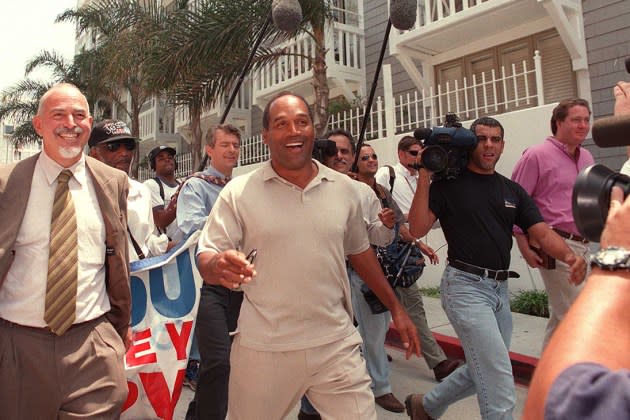The O.J. Simpson Trial Was a Prelude to Media’s Opinionated Present
- Oops!Something went wrong.Please try again later.

On an otherwise uneventful Friday evening, about 95 million people watched a white Ford Bronco slowly driving down the 5 freeway.
The driver of the car, of course, was O.J. Simpson, the NFL star turned actor and TV broadcaster, and that day he officially was named as a murder suspect in the deaths of his ex-wife Nicole Brown Simpson and Ron Goldman.
More from The Hollywood Reporter
America was glued to their TV sets, with the broadcast networks breaking into their regular programing, and the lone cable news channel CNN having its star host Larry King guide viewers through the action (watch it here).
The chase and subsequent trial (“The Trial of the Century,” as declared by multiple news outlets), with its live cameras in the courtroom, became gripping must-see TV. The not-guilty verdict — handed down at 10 a.m. on a weekday — was watched live by more than 150 million people (on day one of the 1991 Gulf War, a mere 118 million Americans tuned in).
If the Gulf War was the moment that CNN proved how powerful a live 24-hour news channel could be, the Bronco chase was a preview of the media ecosystem that would ultimately take hold from that initial innovation.
All of a sudden, TV news — long defined by Cronkite, Jennings and Brinkley — wasn’t just about war and peace, elections and Supreme Court decisions. The salacious, it turns out, rates just as well, and opinions about the news (in this case the daily arguments during the trial) were just as enticing to viewers as the news itself.
The trial became a media machine, launching the careers of a slew of well-known anchors and correspondents. Dan Abrams, ABC’s chief legal correspondent and a NewsNation anchor, was in the courtroom every day (“He was a murderer and yet his cases transformed my life,” Abrams posted Thursday); Greta Van Susteren, now a Newsmax host and a former Fox News anchor, was CNN’s go-to legal analyst during the trial; Gregg Jarrett, the Fox News legal analyst, was Court TV’s top anchor during the trial; Harvey Levin, the TMZ founder, covered the trial for KCBS; Nancy Grace, who would go on to become one of the most high-profile courtroom anchors in TV, became a household name for her appearances during the trial. The list of reporters and analysts who got their breaks during the trial goes on and on (Star Jones, Jeanine Pirro, David Gregory, etc).
The veterans of the O.J. Simpson trial would dominate TV news for decades after it ended, and the opinion-driven coverage it fomented would become commonplace across the TV landscape.
In fact, it helped launch an entire cable news channel: Court TV, which was created in 1991 on the premise that viewers could be intrigued by live court proceedings in districts that allowed cameras in court rooms.
The trial of the Menendez brothers first put Court TV in the public consciousness, but it was the Simpson trial that put it on the map, turning it into the news channel of choice whenever there was a salacious trial with live cameras available (ultimately, Court TV was rebranded as TruTV in 2008 and court coverage would migrate a bit more to streaming, with Scripps relaunching the brand as a streaming service in 2019, and Abrams launching his own Law&Crime network in 2015).
The Simpson trial, it turns out, was a preview of the media that would follow. Fox News and MSNBC carved out their own pieces of the cable news pie, leaning into strong opinions and bluster to outrage viewers in the same way the trials did for Court TV.
While CNN was defined by its coverage of the Gulf War (and would continue to prove its mettle with its live coverage of future wars in the Middle East, not to mention Ukraine), the wall-to-wall coverage of Simpson was something of a prelude to its coverage of Malaysia Airlines Flight 370 and Donald Trump’s presidential campaign in 2015 and 2016, leaning into what its viewers couldn’t get enough of, right up until they were repulsed by it.
And true crime has never been more popular as a genre of entertainment, as the 2022 Johnny Depp-Amber Heard defamation trial proved. The trial shattered viewership records for both courtroom streaming services, and showed that public interest in the intersection of fame and courtroom drama has not abated.
But while Americans were glued to their TV sets in 1994 and 1995, today they get their fix through podcasts and TikTok creators, the 2024 equivalent of the TV news analysts 30 years ago, quick with their opinions and theories, or their takes on who is right and who is wrong.
The Bronco chase was must-see TV and a classic example of the power of live news, with viewers tuning in unsure of how it would end.
But the coverage of the trial — and the ratings bonanza that ensued — underscored just how valuable opinions and takes could be.
Best of The Hollywood Reporter
Meet the World Builders: Hollywood's Top Physical Production Executives of 2023
Men in Blazers, Hollywood’s Favorite Soccer Podcast, Aims for a Global Empire

